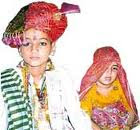 Many people around the world have a question in mind about the child marriages in India. Is child marriage legal in India?. This question arise just because of the ever decreasing incidents of child marriages in India, even though the country is heading to be a developed nation. Believe or not, more than one third of child brides in the world lives in India. A study by UNICEF says that 47% of Indian girls are married by 18 years of age, and 18% of them are married by 15 years of age. The highest rates of child marriages are seen particularly in the least developed states like Andhra Pradesh, Bihar, Madhya Pradesh, Rajasthan, and Uttar Pradesh.
Many people around the world have a question in mind about the child marriages in India. Is child marriage legal in India?. This question arise just because of the ever decreasing incidents of child marriages in India, even though the country is heading to be a developed nation. Believe or not, more than one third of child brides in the world lives in India. A study by UNICEF says that 47% of Indian girls are married by 18 years of age, and 18% of them are married by 15 years of age. The highest rates of child marriages are seen particularly in the least developed states like Andhra Pradesh, Bihar, Madhya Pradesh, Rajasthan, and Uttar Pradesh.
Definition of Child Marriage by UNICEF
UNICEF defines child marriage as a formal marriage or union before 18 years of age.
Is child marriage legal in India?
The answer is a big NO. When we dig the history, it says that before 1929, there was no law related to Child marriage in India. In 1929, Child Marriage Restraint Act popularly known as the Sarda Act was passed which fixed the age of marriage for girls at 14 years and boys at 18 years. It came into effect six months later on April 1, 1930 and it applies to all of British India. The legislation was passed by the British Indian Government. It was finally amended in 1978 to raise the ages of male and female children to 21 and 18 respectively.
In 2006, Government of India passed The Prohibition of Child Marriage Act to address the shortcomings of the Child Marriage Restraint Act. This Act kept the ages of adult males and females the same but made some significant changes for the protection the children. Boys and girls forced into child marriages as minors have the option of voiding their marriage up to two years after reaching adulthood, and in certain circumstances, marriages of minors can be null and void before they reach adulthood. All valuables must be returned if the marriage is nullified, and the girl must be provided with a place of residency until she marries or becomes an adult. Children born from child marriages are considered legitimate, and the courts are expected to give parental custody with the children's best interests in mind. Any male over 18 years of age who enters into a marriage with a minor or anyone who directs or conducts a child marriage ceremony can be punished with up to two years of imprisonment or a fine.
Apni Beti, Apna Dhan
Apni Beti, Apna Dhan (Our Daughter, Our Wealth) is one of India's first conditional cash transfer programs dedicated to delaying young marriages across the nation. It was started in 1994. On the birth of a mother's first, second, or third girl child, government gives 2,500 rupees to invest in a long-term savings bond in the daughter's name, which can be later cashed for 25,000 rupees, after her 18 birthday. She can only receive the money if she is not married.
Recent Statistics - Positive Signs
According to the data released by first Annual Health Survey (AHS) in April 2012, the incidents of child marriage fell significantly over the past few years. The key findings of the latest reports of the survey are as follows:
- One-fifth of marriages in Bihar between 2007-09 involved women under 18.
- In Jharkhand, the proportion of child marriage went down from 60 percent to 18 percent earlier
- Rajasthan with 22 percent cases of child marriage has the highest proportion of women under 18 getting married.
- Contraceptive use remains low despite improvements in several regions.
- Among the 9 states, Bihar has the lowest contraceptive use with just over a third of women aged 15-49 using any method of contraception.






0 comments: